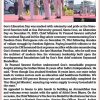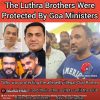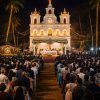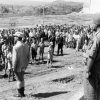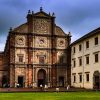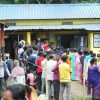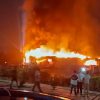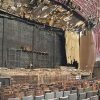Goa is abuzz with excitement as vintage bike and car owners, users, collectors and fans are decking […]
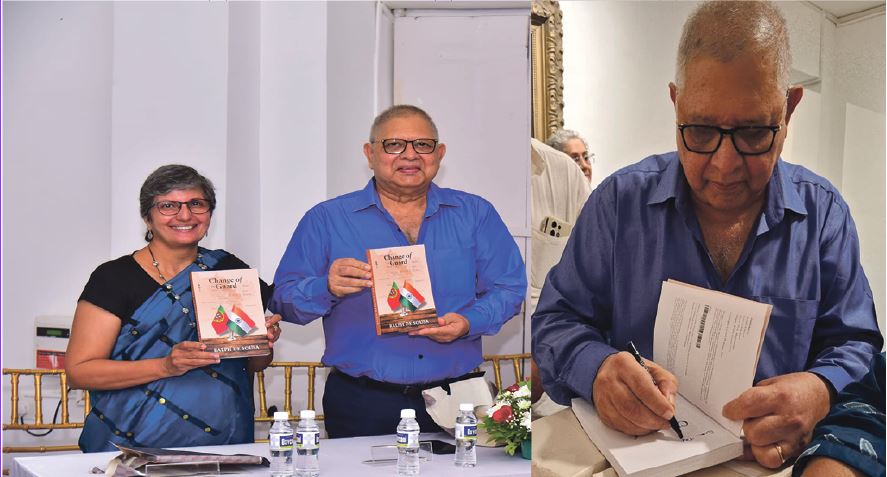
`CHANGE OF GUARD’ IS FOR EVERY GOAN TO READ!
Book Review, Dec 07- Dec 13 2024 December 6, 2024A compilation of memoirs by Ralph de Sousa and other Goans offering insight into both Catholic and Hindu Goa at the time of Liberation in 1961.
IT was one of the old world evenings to remember at the premises of the Fundacao Oriente located at the heritage district Fontainhas in Panaji on November 14, 2024. We were there after ages for the release of quintessential and urbane Goan tourism man Ralph de Sousa, and delighted to see how the place has transformed itself to also offer art gallery and a hall space which hosts quite a few evenings for all kinds of functions including the book clubs in town.
And it was a packed evening with many familiar old timer niz Goenkars and Ponjekars, history buffs and connoisseurs, in the audience. Ralph de Souza’s compilation of writings titled “Change of Guard” offers amusing and educative insight into what life was like at the time of the Liberation of Goa, the years, months, days leading up to 1961, which marked the end of colonial Portuguese rule in Goa after 401 years…both Goan Hindus and Goan Catholics have memories and experiences to recount of those momentous times when the Indian army came marching in, to claim or reclaim or whatever you wish to call it — Goa for India.
Here’s food for thought for those interested in Goa’s undoubtedly fascinating and engaging history from colonialism to freedom. Every state in India has so many stories to tell if you’re asking me! After the release function there was a high tea for all out in the garden and to say hello to some of the contributors to the book, most of them senior citizens naturally and worth interviewing in their own right.
So it was hello to Goa’s women extraordinary Heta Pandit and Nalini Elvino (with spouse Dr Bossuet Afonso) and Lourdes Bravo da Costa and Sapna Sardessai (with spouse Girish), also sharing chit chat were Dr Paulo Gomes, Oscar de Noronha and many more, toasts were made for Ralph’s future adventures in publishing memoirs and the chutney and tuna sandwiches, prawn rissois, with cake of course, were much appreciated, there was wine red and white.
And we take a pleasure in reproducing an excerpt from “Change of Guard” here; the compilation is not just a bouquet of memoirs of Ralph de Sousa but also Valentino Viegas, Jose Francisco Xavier Ferrao, Jose Felipe, Adv Zito Braganca, Sunanda Parulekar, Maria de Lourdes Bravo da Costa Rodrigues, UD Kamat, Manguirish Pai Raikar, Prem Prakash, Vinayak Naik, Ivo Cardozo, Jose Filepe Monteiro, Francisco da Purificacao Monteiro, Edgar Valles, VB Prabhu Verlekar…all with memories worth remembering and recounting of times gone by and to do with a certain observation — “The bond that links your true family is not one of blood, but of respect and joy in each other’s life” (quoting Richard Bach); this last bit we picked up from Sapna Sardessai of “Kokum Curry” where everyone who is pining for some real Saraswat cuisine goes!
Excerpted from `Change of Guard’ by Ralph De Sousa….
MANUEL ANTONIO VASSALO e SILVA
—GOVERNOR GENERAL OF ESTADO DA INDIA
J Filipe Monteiro
MANUEL Antonio Vassalo e Silva (8 November 1899-11 August 1985), an officer of the Portuguese Army and an overseas administrator, was nominated in 1958 to replace Paulo Benard Guedes as the 128th Governor-General of the Portuguese State of India. As his inheritance from the governorship, he was simultaneously the Commander-in-Chief of the Portuguese Armed Forces in India.
This review will focus on his role during the final days and hours that preceded the “Change of Guard”.
To understand his involvement during the last chapter of the Portuguese presence in India, some episodes – a brief reflection of his state of mind and how it influenced his final decisions as the supreme civil and military commander – will be narrated in his own words.
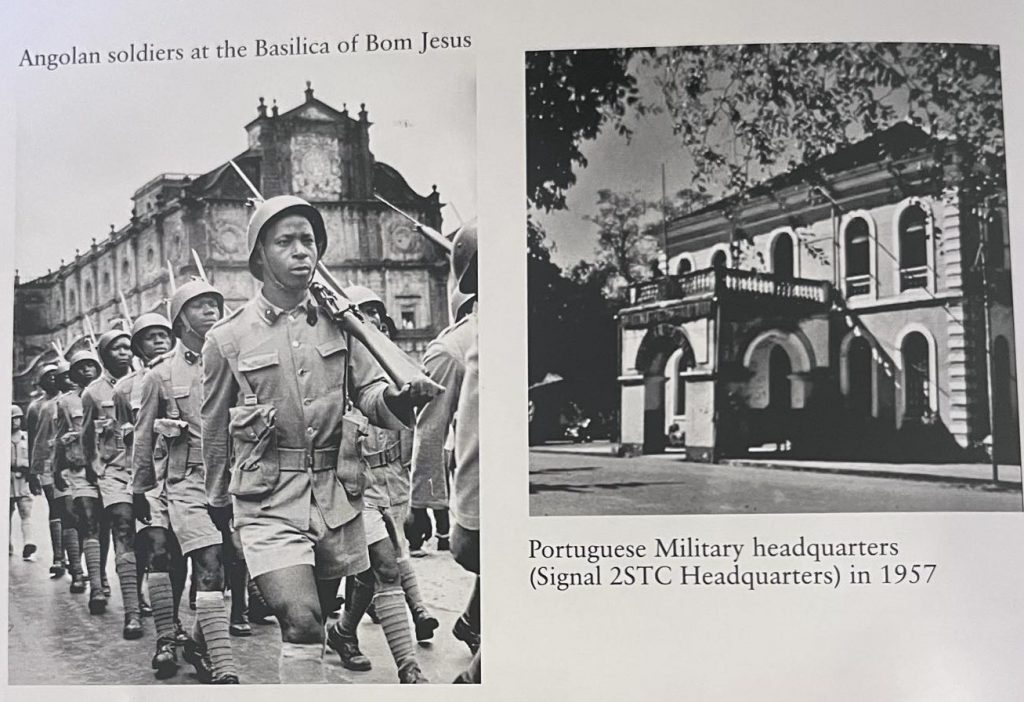
A civil administrator
An engineer from the faculty of sciences of the University of Lisbon, with a bachelor’s degree in mathematics and preparatory studies in military engineering, he entered the Army School in 1922.
In Timor, where he served on a military commission, he was head of the military division and director of public works.
Returning to Lisbon in 1947, General Vassalo e Silva was appointed full professor at the Army School. He was engaged in various civil engineering works, including the urbanization plan for Lisbon, the study and design of the municipal slaughterhouse, the water supply to the capital, and the study of earthquakes on S. Miguel Island.
With this background, it was not surprising that when he arrived in Goa, as the governor of the Portuguese State of India and Commander-in-Chief of the Portuguese Armed Forces in India, he immediately set his sights on enhancing the infrastructure of the territory. His efforts included building or renting houses for primary schools in villages, rehabilitating degraded churches and temples, improving, and shielding the water drainage of paddy fields, expanding the TAIP air fleet and legislation on mining exploitation, and constructing an automatic ship loading pier.
A sizeable portion of his plans were successfully executed until the point when his utmost distress was directed toward the threat posed by the concentration of the Indian army near the borders of Goa, Daman, and Diu, in the final weeks before Operation Vijay.
It was in this scenario of pre-war preparatory arrangements, that at the beginning of the second week of December, the lieutenant surgeon António Correia de Lima was directed to set up a field hospital in the city of Vasco de Gama, for war casualties of South Goa. He did the groundwork and arrangements within a week. However, due to the imminent threat of bombing Burma Shell deposits located in this city, and with the Sentinel Plan in full swing, he decided to make some changes to the initial plan. It was a race against time to look for new premises further away from the city. Having found an empty house, which happened to be TAIP flight commander Solano de Almeida’s mansion, he decided to contact the governor, who was at the time in the Saint Jacinto shipyard, to lay out the plan for the situation. It was around midnight of 19th December, barely twelve hours before the surrender. General Vassalo e Silva, who was alone in a hall welcomed and requested the doctor to sit. Later, the surgeon would realize that all the Governor wanted was to have a cathartic conversation about his time in the colony:
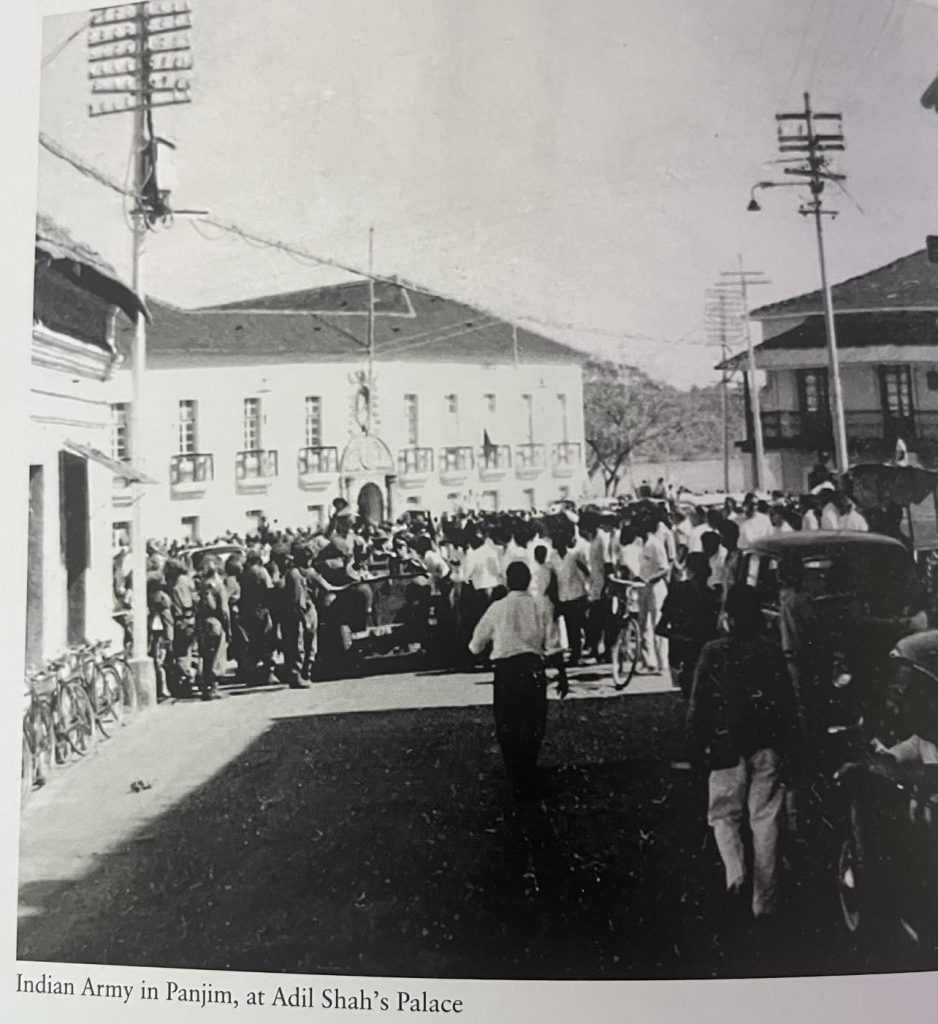
“I have been here reviewing my entire process in India. To know if it was worth it, if I did what I should if I did everything I could. You know doctor, when I arrived in 1958, the general budget of the State of India was lower than the budget of the City of Lourenço Marques (nowadays Maputo). And as by state statute, you had financial autonomy to get money to do anything, it was hell! You had to beg for alms at the ministry.
What could Goa sell that could make a huge profit?
The territory was rich in iron ore. There were zones with 75 percent iron content. It was an exploration that was truly little developed, and little encouraged. But it was an important natural wealth…
In one year, the government passed the legislation on mining exploration. Agreements and contracts with the Japanese, the main importers, and all the necessary infrastructure for export were built.
In three years, it went from three, or four ships loaded per week, to three, or four per day.
In three years, the state of India went from being one of the poorest overseas provinces to the richest, richer than the entire overseas province combined. And as the iron was paid in the foreign currency indicated in the contracts, the foreign exchange reserve of the state of India became greater than that of the Portuguese state itself”.
In the surgeon Correia de Lima retrospective, the governor proceeded with a revival and self-analysis of his 3 years of governance; he remembered his intervention in various fields, from education, where the teaching of the Portuguese language was encouraged and endorsed by opening new schools, reformulation of the books, and providing scholarships for universities in Portugal.
He got along with other achievements, namely the State of India’s policy to mint its own coin. In health, the organization of a network of civilian
doctors to support the population with the contribution of military doctors. In culture, he laid the foundations for the creation of museums in different fields.
The young surgeon’s awareness was stunned with yet another confidence of the governor about the request of the Portuguese government in Lisbon and his refusal to send to Portugal the sacred relics of Saint Francis Xavier. In the governor’s words, the reason for his refusal: “Saint Francis belonged to these people (Goans) who accepted, followed, and venerated him. It was because of his activity as a preacher in this region that Francis Xavier was given the nickname Apostle of the Indies, or Apostle of the East. And it was because these people wanted, that his body was moved from China, where he died and had been buried, to Goa, a year later. It was due to the cult that these people dedicated to him, that his great achievements as a saint were recognized by the church, he was canonized, and his cult spread throughout the world.
Francisco Xavier, by birth, was not even Portuguese. He was Spanish. But St. Francis Xavier is a Goan. And here he should stay. In his land. In the land that made him Holy.”
It was five in the morning, and before saying goodbye, as the general had to visit the troops on the front line, he had these words off his chest:
“No one has any doubt that this war is lost. But how is this going to end? Will the Indians destroy the traces of the passage of Portugal in the Estado da India? Could the confrontation of Portuguese soldiers encourage greater and heavier retaliation against these people, against our shared past? How do I separate, put aside, this people, this land, from the political- military question that exists between Portugal and the Indian Union?”
Before the surgeon left the hall, he was silent. He lowered his head, then raised it and stared out at the moonlit trees!
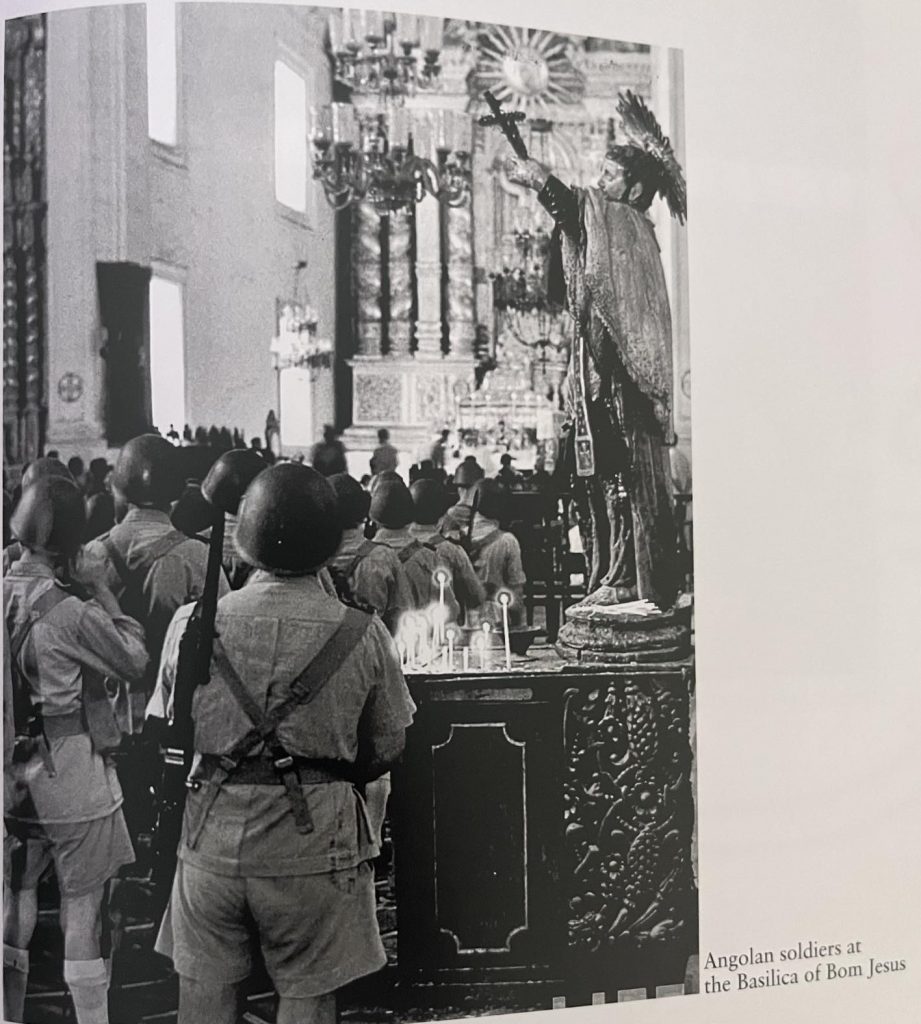
(Excerpt from the book “O Fim dos Séculos- Goa, Damão, Diu”. António Correia de Lima. Bertrand Editora. Venda Nova 1997.)
The message to evacuate the mortal remains of St. Francis Xavier is also stated by Carlos de Azeredo, in his book “Trabalhos e Dias de um Soldado de Império”. Livraria Civilização Editora. Porto 2004.
The directive, sent by the minister of the presidency Dr. Correia de Oliveira, was addressed in the following terms:
Commander-in-Chief of Portuguese Armed Forces
General Vassalo e Silva took over as Commander-in-Chief of the Portuguese Armed Forces only after the first week of December 1961, when there was no doubt that military action against Goa was certain. His role, as the ultimate responsible for the military decisions can be understood from the reading of the book A Queda da Índia Portuguesa – Crónicas da Invasão e do Cativeiro. Carlos Alexandre de Moraes. Editorial Estampa. Lisboa 1995.
A year before, in December 1960, following a visit to Goa by the Undersecretary of Army Left Tenant Colonel Francisco da Costa Gomes, who would be the second president of Portugal after the April Revolution in 1974, it was decided by the Portuguese government that there was no likelihood of any military action, by the Portuguese armed forces.
This was also admitted and confirmed, by Portuguese Prime Minister Oliveira Salazar in a speech delivered in the National Assembly, on 3rd January 1962, following the military actions against the territories on the western coast of India: “…since the Indian Union could multiply, by an arbitrary factor, the forces of attack, in the end, there would be a great disproportion.”
This premise led to the definition of a diminution in the defense apparatus, both in terms of personnel and technological components.
Furthermore, in March 1961, Angola saw the beginning of a guerrilla campaign in pursuit of its independence.
On April 13, Salazar announced the start of the Colonial War with the famous phrase, “To Angola, quickly and in power.” Therefore, it was imperative that all the military resources of Portugal be directed toward this colony.
The defense personnel in Goa, Daman, and Diu felt the immediate impact. Following orders from the government in Lisbon, the overall number of military personnel in Goa was reduced from 12,000 to 3500.
The defense layout nicknamed “Plano Sentinela” (Sentinel Plan) engineered in Lisbon, was designed to delay as much as possible the seizure of territory.
In this setting, a message (Radio 816/A) of December 14, 1961, drafted by the Chairperson of the Council of Ministers to the Governor, clearly stated “I do not foresee the possibility of a truce or Portuguese prisoners, as there will be no surrendered ships. As I feel that there can only be victorious or dead soldiers and sailors.”
On December 18th, at 6:30, a phone call from the Chief of Staff proclaimed that the Sentinel Plan would enter immediately into action. Operation Vijay blitzkrieg moved quickly and deeply into the territory of Goa, overcoming the limited resistance offered by the Portuguese army. By 12-30 started the naval battle between the frigate Afonso the Albuquerque and the Indian Navy fleet. The High Command of the Portuguese Army witnessed the combat at the shipyard near San Jacinto Island.
By 15-30, the Patriarch of the East Indies, Dom José Alvernaz, along with Captain Pinto Brás, contacted the governor and requested that he surrender. At that time, the governor refused to comply with the request. General Vassalo e Silva decided to remain at the command headquarters of the brigade.
Late in the evening, a message from All India Radio informed that Indian military forces would conduct a bombardment of the city of Vasco de Gama, including the Burma Shell oil installations.
On December 19th, by 12-15, with the surrender of the Afonso de Albuquerque division and after a detailed analysis, General Vassalo e Silva informed all the commanders present of his decision to surrender.
The official message stated:
“Having the defence of the Mormugão Peninsula, the final stronghold – as a base for the occupation by our forces of positions that would put the city of Vasco de Gama under cover of the aerial, terrestrial, and maritime fire of the enemy and of the inevitable consequences of a close fight and still bearing in mind the disproportion of the forces and resources present, which do not allow the combat to continue without a great sacrifice of the lives of the inhabitants of the city of Vasco de Gama – I made the decision with a highly constrained and omnipresent national sentiment to engage with the enemy at a time when its approach poses a threat to the population of the city that I aspire to save to obtain a truce in accordance with the authority granted to me by the letter of the command…”
Headquarters in Vasco de Gama at 14:00 on December 19th
The General Commander-in-Chief
Manuel António Vassalo e Silva
In the presence of the Chief of General Staff, Left Tenant Colonel Marques de Andrade, D. José Vieira Alvernaz Patriarch of the East Indies, and one interpreter, the medical graduate Captain Garcia da Silva is appointed to contact the Commander of the Indian Union Armed Forces with the following message:
“Under the terms of the communiqué that was sent to Your Excellency and in accordance with the powers conferred on me by the Letter of Command from the Central Government, I request Your Excellency’s suspension of fire between our forces, starting from this moment.”
Headquarters in Vasco de Gama at 14:00 on December 19th The General Commander-in-Chief
Manuel António Vassalo e Silva
In less than 48 hours, the time elapsed for the Change of Guard, there are some circumstances and episodes that deserve some reasoning: What is the reason for the presence of the highest Catholic hierarchy member in the theater of military operations? What was his role?
On the other hand, what prompted the governor to change his mind, when just 24 hours earlier he had not accepted this advice?
Regarding the first cross-question, a justification for his presence can be his moral authority to persuade and counsel the commander-in-chief of Portuguese armed forces to surrender and avoid bloodshed with a massive number of civilians and military personnel, wounded and dead, and a considerable loss of life.
As a matter of fact, Captain Carlos Azevedo writes in his book that General Vassalo e Silva assured him, in the prisoners-of-war camp of Alparqueiros that Patriarch Alvernaz was there to request him to surrender and thus avoid a bloodbath, civilian and military death, and destruction of property. In my judgment, the Patriarch’s contribution, which cannot be considered negligible, to prevent bloodshed, destruction, and carnage should be remembered and praised by the Goas populace.
Regarding the second inquiry, I presume that the response derives from the contemplation and analysis conducted by the general, which has previously been referenced by Lieutenant Surgeon António Correia de Lima and Captain Carlos Azeredo.
General Vassalo e Silva himself appointed this captain as the liaison officer between the security forces and the commander-in-chief on December 17. The proximity between the captain and the general during the final days of Portugal’s sovereignty in Goa and thereafter in POW’s camp of Alparqueiros, until the generals shift to Ponda camp, enabled him to observe numerous occurrences in the days preceding and following the change of guard.
77While General Vassalo e Silva was in the Alparqueiros, Prisoner of War Camp, he confided to Captain these words:
“You know, Captain Azeredo, a military leader in my circumstances, after analyzing all the combat possibilities, if in a thousand he finds one successful, he has an obligation to risk his life and that of his subordinates. But if all evaluated possibilities are exhausted and no success is found, the military leader is not an absolute master of the lives of his men and his own and he can only accept defeat and surrender with dignity after a symbolic but honorable resistance.”
At the time, Captain Azeredo was thirty years old. He recalls and praises the courage of a soldier (General Vassalo e Silva) who fought back against the destruction of a small house called “Goa House,” its landmarks, and the people who lived there.
Two days after the cessation of hostilities, Captain Carlos Azeredo was privy to the arrival of General Chowdary, the Commander-in-Chief of the Indian Armed Forces.
When General Vassalo e Silva, who was sitting at a small table, saw the Indian General entering the room, he made a move to get up. General Chowdary stepped forward, held his shoulder, and did not let him stand up. He said his visit was to express his compliments and to let the Indian government know that his wife was doing well and that the Indian government was looking forward to providing her with a return to Lisbon. He wanted to congratulate the Portuguese armed forces for their excellent defence against the Indian army, despite their few resources.
He greeted the Portuguese general with apparent appreciation. In the words of Captain Azeredo, “I was not aware that we (the military personnel) would be treated with less consideration by our comrades, than our adversaries.”
Tribute to a General
General Vassalo e Silva refused to comply with a series of directives issued by the office of the Prime Minister of Portugal, Dr. Oliveira Salazar. Faced with superior orders and conformity with military laws on the one hand and his conscience and ethical values on the other, he opted for his inner voice.
The governor fell into disgrace because of his attitude of disobedience. When the general returned to Portugal, the Portuguese authorities met him with a hostile reception. Subjected to a court-martial for non-compliance with instructions, he was expelled by the government from the military and placed in exile.
The government that followed the April Revolution in 1974, following the demise of the authoritarian regime, reinstated his status, and liberties. Subsequently, he was conferred back with his military rank.
From the very beginning, Portuguese territories in India were the only ones that were ruled by a viceroy. Dom Francisco de Almeida was the first, appointed in 1505, and Afonso de Bragança the last. He ended his mandate with the establishment of the Republic in Portugal, on October 5, 1910. In my opinion, during the half-century of the Portuguese Republic, General Vassalo e Silva was one of the governors of Estado da India, who did his utmost to promote the progress of Goa.
In the Changing of Guard, the population recognized his role in the deterrence of death among the military and civil population, the destruction of property, and not allowing the relics of Saint Francis Xavier to be moved to Portugal.
On his state visit to Goa in 1980, the population of Goa gave him a warm welcome. His name will be etched into the reminiscences of Goa’s past.
An introduction to the letters exchanged between General Vassalo e Silva and the Velho family, when the General was a prisoner of war at the Ponda military camp post 19th December 1961 – An introduction
-by Francisco Purificacao Monteiro.
Upon his assumption of the position of Governor General of the State of India, General Manuel António Vassalo e Silva stated that he came with a firm determination to ensure the development and welfare of the populace of Goa, Daman, and Diu.
He exhibited a proactive approach by initiating visits to all talukas and their locations, even the most remote ones, to listen to the sentiments and
Range comprehend the genuine requirements of the populace. Likewise, he was keen to hear from the principal participants involved in the broadest of economic endeavours. Therefore my Uncle Aleixo Pitágoras Velho who was at the time the Executive of the Industrial and Commercial Association of Goa, was received by General Vassalo e Silva at the Palace of Hidalcão/Adil Shah. In a frank and open conversation, they exchanged views about the situation of commercial and industrial activity, its aspirations, needs, bottlenecks, and development projects.
General Vassalo e Silva maintained these informal meetings throughout his mandate, which ended abruptly following ‘Operation Vijay’ and the annexation of Goa.
Uncle Pitágoras and his wife Blandina were very well known and respected personalities in Goa, so it is no surprise that they were known to General Vassalo e Silva and, as I mentioned above, he was the President of the Commercial and Industrial Association of Goa and had working meetings with General Vassalo e Silva.
It is public knowledge that General Vassalo e Silva had created an aura of great admiration and sympathy among Goans of all social conditions. When, after the surrender, General Vassalo e Silva became a prisoner of war (POW) of the Indian armed forces in Pondá, he received many messages of sympathy. He was visited by many people who expressed their deep regret for the situation he was experiencing. As a gesture of appreciation and recognition of the good governance under his leadership, he received messages of sympathy and gratitude, gifts and souvenirs. In my opinion, what led my Uncle and Aunt to send the hamper was:
firstly, he knew them well and held them in great esteem. Secondly, it was for the recognition of good governance under him and finally, for having spared the destruction of Goa, which would have been the case, had he decided to fight and resist until the end.
